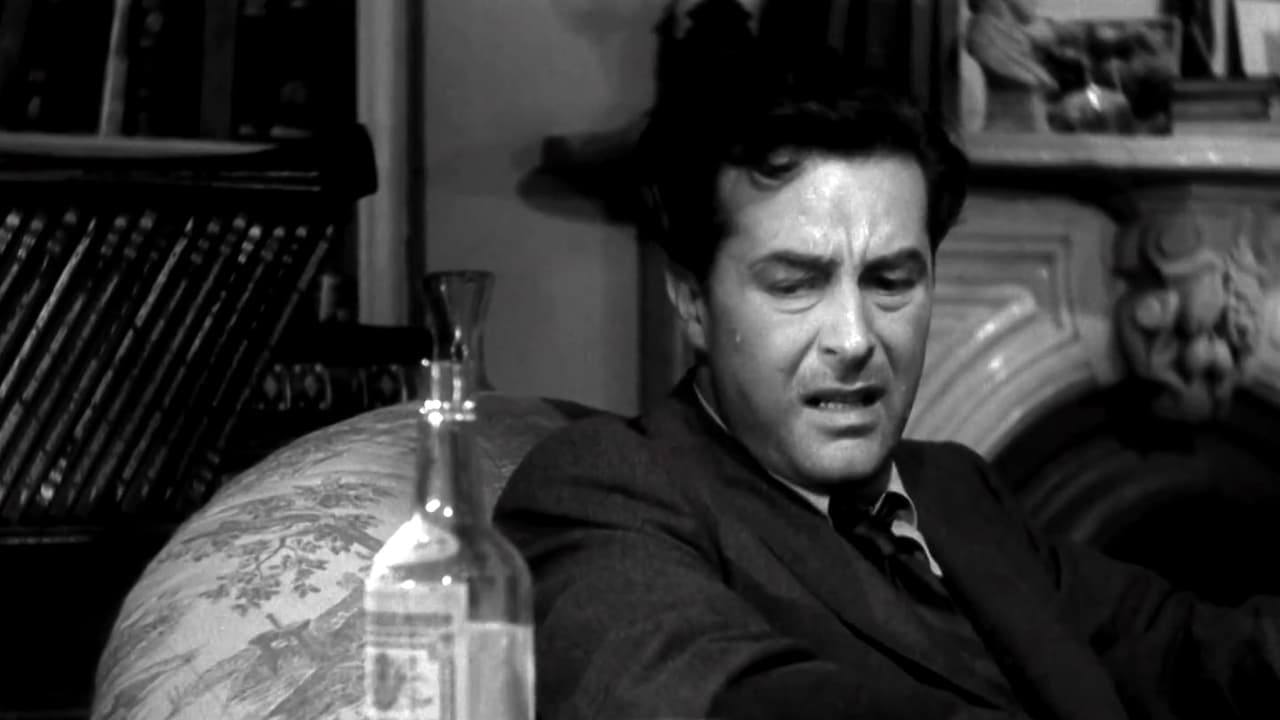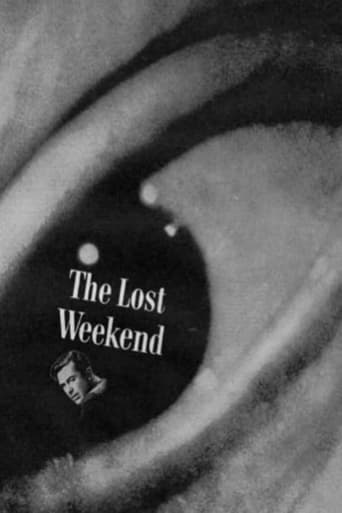

People are voting emotionally.
... View MoreGripping story with well-crafted characters
... View MoreThis film is so real. It treats its characters with so much care and sensitivity.
... View MoreThe movie's not perfect, but it sticks the landing of its message. It was engaging - thrilling at times - and I personally thought it was a great time.
... View More'The Lost Weekend (1941)' wraps itself up a little too quickly to be entirely convincing, though the promises made in the finale could be just as empty as those made in the opening (making the ending much darker than it appears to be), and there is the occasional lull in pace marked by a repetition indicative of the alcoholism of the protagonist, but it's a daring and generally powerful cry against addiction in all its forms compounded by some excellent writing and performances (especially the Oscar-winning turn from Ray Milland) that really get into the psychology of the characters. 7/10
... View MoreHaving apprehended the précis of what the film is about, one's knee-jerking question might be, what is the allure of watching a congenital soak drinking himself to stupor over a weekend's spell if the viewer is fortunate enough not being subjugated under such a distasteful spell? Surely Billy Wilder's THE LOST WEEKEND, a prestigious Hollywood classic and Oscar's BEST PICTURE winner, can dissipate this nagging doubt, because alcoholism is just one of many a jones scourging our human race, more or less, everyone can find some connection with the story, and Wilder sensibly attest that the battle cannot be won without the cooperation of own's volition and the external succor. Ray Millard plays a New York writer Don Birnam, driven by his execrable addiction to the brink of self-destruction, and Mr. Millard's Oscar-winning performance is a tour-de-force with a capital T. It is a daunting task a priori, Don is not necessarily a character who can rally audience's compassion prima facie, a coward he is, indeed, shirking from a resolution of fighting back, apparently he doesn't deserve redemption, not least a virtuous girlfriend like Helen St. James (a saintly Wyman), who has been nothing but supportive for three years by his side. Don's ordeal is a vicious circle which he has no strength to shuck off, Mr. Millard viscerally points up his painful struggle, poignant self-pity, undignified resignation (when he deigns to pilferage, scrounge and coercion on multiple occasions to slake his craving), plus a vestigial ghost of hope through the utter misery shrouding Don's downward spiral. Maybe we shouldn't root for Don after all? It is not hard to conjecture Mr. Wilder's would stick to his gun until the finale (as in his pièce-de-résistence ACE IN THE HOLE 1951), since Don's ominous undoing is primed like such an inexorable force rushing in the homestretch, to a certain point, it even seems audience would be okay with a totally tragic denouement in this cautionary tale, which actually makes the far too convenient magic cure near the finish-line feel contrived and compromised, a quibble might be deemed as a blemish on the film's otherwise intact integrity, again, it is not the happy ending per say which rouses one's demur, but is the wholesome process how that ending is presented. In this case, it is unsatisfactory by half. Visuals-wise, Wilder tactfully interlaces some expressionist panache onto the movie's monochromatic sheen, the most striking specimen is the moment when Don is temporarily locked up inside a drunk ward (where Frank Faylen makes an impressive cameo as a male nurse), the horror and despair does creep against the shadows of iron bars and its aural cacophony into a spectator's core, not to mention the bat-assaulting-rat figment in Don's delirium later, burnished by Miklós Rózsa's nightmarish and eerie string score, which, sometimes, is truly unsettling as our sonic cues of inner-anguish and self-abandonment. There is irony too, the "Champagne Aria" from LA TRAVIATA which tantalizes Don's thirst is a hoot, so is Don's desperate attempt to hock his typewriter on the day of Yom Kippur, for all its intents and purposes, THE LOST WEEKEND is a transfixing social critique in its essence, but laden with some less savory footnotes, for instance, that game-changing kiss sweeping Gloria (Dowling) off her feet is so damn an exemplar of male wish-fulfillment, Wilder and his screenwriter Charles Brackett should've known better, no well-adjusted woman could enjoy a moribund man's booze- macerated kiss, not even it is from someone who is as good-looking as Mr. Millard, that is what this reviewer can vouch for.
... View MoreLOST WEEKEND is a film about the state of life of any man. In general, every life is full of ups and downs. Alcoholism, as a kind of escape from his own life is more than stable. Lack of self-confidence, poverty and lack of understanding are just some factors with which the main character struggles. Alcohol is a deadly rescue. The story is quite realistic and morbid. The main protagonist is a split personality. We get to know him through the illustration of a drunk and writer in the attempt. I have to admit that this movie at first viewing fascinating.I have to admit that the minor characters have been pretty naive. I have the impression that the main protagonist and bottles of alcohol tell a story, while minor characters just go and get lost. Practically everything is told in a couple of days where we can see how a man touches a human and moral bottom. Unwritten parts of the novel through flashbacks working perfectlyRay Milland as Don Birnam is simply brilliant. He revealed the ugly nature of man, through the degradation of life, weakness and shame.Jane Wyman as Helen St. James had the demanding role of loyal girls. In this case, love knows no boundaries. The lack of emotion is so obvious and I her character can not imagine as a kind of salvation or the voice of reason.Other characters are "stations" on the road to environmental ruin. Caring and exemplary brother who miraculously evaporate at the beginning of the film. Ironic and gritty bartender, sadistic medic or girl in love at the bar.Lost Weekend is a very honest and disturbing drama. The musical score perfectly corresponded to the theme of the film. I must say that I am not satisfied with the contrived happy ending. The main protagonist in 5 minutes free his life of suffering. It's all in the decision, but the decision came suddenly and utterly illogical.
... View MoreAs great as Days of Wine and Roses is, to me The Lost Weekend is the more powerful film on the subject of alcohol addiction.What is so striking is how much truth there is in how it deals with a sensitive subject and how ahead of its time it is (at a time where it would be so easy to skim over what is so cruel about alcohol addiction, which The Lost Weekend did not), while also being wholly relevant today at the same time seeing as alcohol addiction is very much a big problem now. It is a simple story told harrowingly (the nightmare sequence is still horrifyingly freaky by today's standards) and incredibly movingly, with nothing incoherent about it, with every aspect of the addiction explored realistically and plausibly (doing a better job than Days of Wine and Roses of showing the desperation and guilt). All in a way that is never sugar-coated or heavy-handed, difficult to do for subjects like alcohol addiction and films with a message.The Lost Weekend is both grittily and sumptuously filmed, with first rate location work, it's a very visually pleasing film while also matching the film's tone perfectly. Billy Wilder's direction is also superb, he is sympathetic rather than patronising but is also uncompromising, it was also surprising that he managed to still bring his characteristic mordant wit to a story so grim, something that almost certainly would have jarred in lesser hands. Miklos Rosza provides one of his most haunting scores, it fits perfectly but is never obvious and repetitive, and the use of the theremin was effectively nightmarish but was equally effective showing the pathos of alcoholism (the main reason apparently for its use.It's very thoughtfully scripted too, making the viewer think long and hard about the subject and motivations from the very first scene, and it also develops the characters compellingly. Nothing is black-and-white or stock, in fact it's straightforward but the characters are the kind that are flawed but with enough room for empathising towards them. The acting is very good. Ray Milland wasn't always the most compelling of leading men at times, however in a piece of casting that was courageous and pretty ingenious he gives a career-best turn, rarely did he show this much range or emotional depth than here. Jane Wyman contrasts beautifully in one of her better and more sympathetic performances, while Phillip Terry brings good realism as the brother. Contrastingly their scenes are more soft-centred, but they do still work.The Lost Weekend's only real pitfall, from personal opinion, was the too pat and too-easily-resolved ending in a film that cried out for the complete opposite considering everything that happened before, it just felt tacked on.Otherwise, The Lost Weekend is a wonderful film that came so close to a masterpiece. Maybe not one of Billy Wilder's best films, but this is only because so many of his films are so outstanding (even his lesser films are worth seeing) which is testament to how great a director Wilder was. 9.5/10 Bethany Cox
... View More